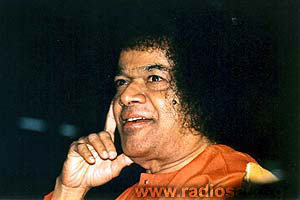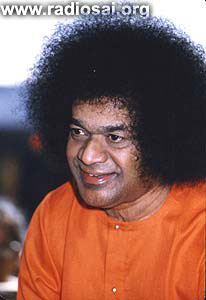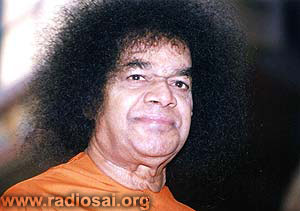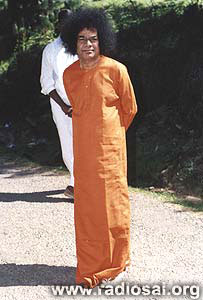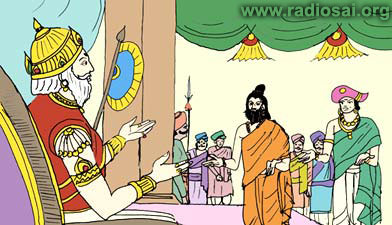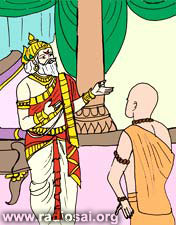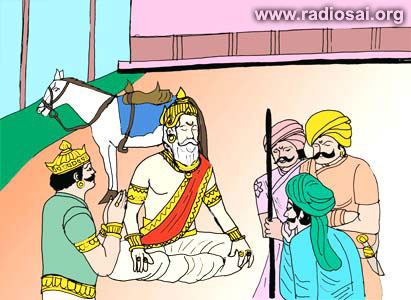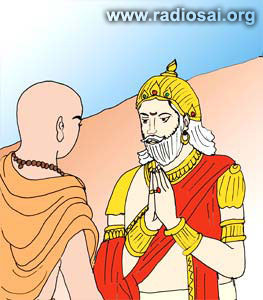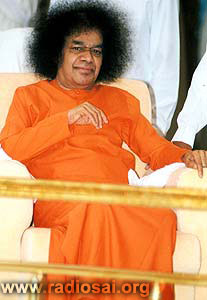 |
 |
 |
Volume
7 - Issue 01
JANUARY - 2009 |
CONVERSATIONS WITH SAI
CHAPTER 4 - THE OUTER DOOR Prof. Anil Kumar: Swami! We are engrossed in worldly problems and responsibilities. We get deeply involved in self-centred activities. Yet, we pray to God. In a sense, our minds are fully occupied with mundane thoughts. What is to be done? Bhagavan: The Mahabharata explains this aspect clearly. The righteous Pandavas, the five brothers who spent their time in exile, never lost their devotion. Everything in life depends on priorities. They kept God first, others next, and considered themselves the last. Therefore, they were successful, and are remembered till this day.
On the contrary, for the Kauravas (their cousins), the priorities were different; they kept their comfort and selfish interests in the first place, others next, and God last. What happened? They lost the battle and received a bad name. Since they placed God last in their priorities, they lost the battle. If you have God with you, you don't need to worry. You will be successful in all fields. After all, in this world nothing is permanent; all are passing clouds. Not even one is permanent. Know that whatever happens in life, it is for your own good. A human being walks on his two legs. So he is erect, unlike the four legged animals: After marriage, man loses some of his freedom with increasing responsibility, and becomes “four legged" and his walking pace slows down. With a child born to him he has “six legs" like those of a scorpion, and with another child he turns eight legged like a cockroach, and his movement further slows down. All this bondage and attachment is of your own making; nobody made it for you. In spite of all your riches and positions, remember that true happiness lies in the company of and nearness to God. You may keep a fish in a gem studded golden vessel; it will never feel comfortable there. It freely swims only in water. Bliss lies in your true self. The rest, however valuable it is, leads only to unhappiness.
A simple example for you: Here is a glass of water, with sugar at the bottom. If you taste the water on the top, it is tasteless; and it is the same with the water in the middle of the glass too. But, get a spoon and stir the water in the bottom well until the sugar gets totally dissolved in the water. Now you taste it, either at the top or in the middle of the glass, the water is sweet. If you exercise your intellect in the right direction, you will experience the sweetness of divinity everywhere. So also in your life, 'the glass' is your 'body', 'water' is your life', the 'spoon' is your 'intellect' and 'sugar' is 'divinity'. If you exercise your intellect in the right direction, you will experience the sweetness of divinity everywhere. What you need are peace and happiness. You should pray to God for these two essentials. You worship Him and serve Him; you aspire to be happy and peaceful, no doubt. But, your prayers to God are for worldly possessions. So, aspirations and prayers are at variance with each other. This is your weakness. Prof. Anil Kumar: Swami! Today, Sai glory brought almost everybody from all parts of the world to Your feet. People from many countries, whose names we had never heard before, are coming to You. People of almost all linguistic groups of the world are here. We have representation from all walks of life. It is unfortunate that we, who have been here with You, find ourselves less devoted to You than Your overseas devotees. We see them practice Your teachings with much more sincerity of heart than us! Why is this happening? Bhagavan: The experiences of the devotees depend on their sincerity, steadfastness, devotion and faith. Nearness, in one way, is responsible for not realising the actual value of Divinity. Don't you find a shadow under a lamp? Similar is the case here. As the light of the Avatar spreads everywhere, there is shadow underneath the light. You also know that honeybees come from a distance to suck the honey out of the lotus flower, while frogs, snails and fishes so near the lotus flower do not know the taste of honey. The same thing happens when God incarnates in human form. People who are very near Him will not to be able to realise His divine splendour.
When you hear of a mango fruit, you feel like eating it. But when you go to a market and see fruits there, you take a fruit close to your nose and start smelling it. Why? You doubt if it is a ripe fruit or not. The very mention of the name of the fruit made you long for it. But when you are near it, you doubt. Isn't it so? Why go for such a farfetched simile? Just as darkness is dispelled by a flash of light, the darkness of ignorance should be dispelled by the light of wisdom. If you have full faith and love for Swami, you will follow His teachings. Well, you speak ecstatically to everyone saying that Baba appeared in your dreams and that you experienced His presence at your place. But, when you are in the immediate presence of Baba, you are not even thrilled and excited. You, people who are so near me, don't know the tremendous and magnificent experiences of devotees all over the world and their magnitude. A frog in a well cannot know the outer world, you see! It is not the length of time or the number of years you are with Swami that matters! Bus drivers come here and go from here daily. What experience do they have? You may keep an iron ball in a water tank for any length of time. What happens? It undergoes absolutely no change in any way! Just as darkness is dispelled by a flash of light, the darkness of ignorance should be dispelled by the light of wisdom. If you have full faith and love for Swami, you will follow His teachings. You find a spectacular transformation in the life of umpteen numbers of people everywhere. Why? It is because of their implicit faith in the teachings of Swami. I don't send invitations to anybody to come over here. There are no welcome boards nor do I say goodbye to anyone. But people come in large numbers everyday. Why? This is the love of Divinity that attracts and draws people to this Prasanthi Nilayam. It is only God whom you respect, love and worship. You respect your boss, administrators, elders, etc; you love your parents, family, and friends. All the same, you don't worship your officers, or the members of your family. Isn't it so? But you respect, love and worship only God. Prof. Anil Kumar: Swami, devotees come from far off places like Argentina, Philippines, Guatemala, Russia and many other countries from all over the world. They return from here with heavy hearts, not able to leave You. How should they take it and what exactly do You want them to do in such circumstances?
Bhagavan: You should experience the omniscience of God. God is always with you, around you, below you, above you and in you. In fact, you are God. Devotees come to Swami to charge their batteries. Always remember this: 'Near' is not important to Swami, 'dear' is important. The flame burns brilliantly when the breeze blows. Two wooden pieces are close to each other; this is 'nearness'. As you light and burn them, you also fan them, so that the flame rises upwards. This fanning is 'dearness'. Mere nearness is not enough. Always remember this: 'Near' is not important to Swami, 'dear' is important Suppose there is a lotus flower in a lake. There are a number of fishes and frogs in the same lake that do not know the value of the flower. But honeybees come from long distances and suck nectar from the flower. Bees represent dearness, while frogs and fishes stand for nearness. Similarly, you know the lighthouse from which light spreads all around guiding the ship's voyage. But, under the lighthouse, it is dark because of the shadow. So, light around is dearness, while the shadow underneath is nearness. So, devotees, who go from here, should understand this. They should strive to be dear to Swami and not merely near to Him. Prof. Anil Kumar: Swami! It is our common experience that some of us are quite good for sometime - devoted, disciplined and dutiful, especially when we are here in Your proximity. Then, why do we change when we are somewhere else? What happens to all that we learn here? Why do we lose sacred qualities like sincerity, devotion and steadfastness when we are away? Kindly pardon our mistakes and let us know the causes of our downfall?
Bhagavan: This is a wrong statement. Sincerity, devotion, discipline, steadfastness and all the noble qualities that you claim to have possessed while you are here are not true and natural; they are artificial. They are like plastic flowers that are not fragrant, and cannot attract bees. It is all your show or trick. God is never carried away by these artificial, temporary, and external features. God looks into your heart and internal nature. You say that circumstances change you. If noble qualities were really present in you, you wouldn't change due to the change of circumstances. No change in the environment will ever affect you. Truly, the mistake lies in you alone; you don't have strong faith and conviction. In fact, the seeds are there lying underground and are waiting to sprout at an appropriate time. Environment has no legs, hands and life to move about like you! You are now here in Kodai Kanal. You are fully clothed, with sweaters and shawls, rugs and blankets and all the woollen stuff to keep you warm in this cold place. If you don't have warm clothes, whose fault is it? Whom would you blame then? Similarly, you know how challenging and testing life is in the world today. It is your own responsibility to carry with you the blanket of duty, the rug of devotion and wear the sweater of discipline whenever you are exposed to the severe cold winds of neglect of duty, disobedience of God's commands, and vagaries of ego and disbelief. If you wear this warm woollen clothing, you will not be affected by the cold climate. You have to protect yourself, and blaming the environment is of no use. If good thoughts and good behaviour are in you, you will remain unaffected, whatever be your surroundings. Prof. Anil Kumar: Swami, we are here by Your sheer grace and mercy. You say that You spend three-fourths of Your time on Your boys. What do You want us to do? Bhagavan: There is nothing you can do for Me. I don't need anything from you. I only give and never receive. I do not accept or receive anything from anyone. I never stretch My hand before anybody in order to receive something. I have never asked anybody for anything till now. In fact, all things happen according to the will of Swami. But, I ask you to give Me only one thing, and that is enough. What is it? It is your love. Your parents sometimes stay away from you. But I am always with you, in you, below you, above you and around you. I am indeed yourself. If you remember this always, that is enough. [To the students] You follow Swami, and you will shine like a precious gem in the future.
You will be highly respected and will get a good name in society. Whatever you have learnt here in the hostel and the college, and on top of all this, the love of Swami you have received should never be forgotten. Get for yourselves a good name. Follow Swami's teachings. Once King Janaka put a question in the open court, "Is there anyone who can teach me Brahmajnana, knowledge of the ultimate reality, within the time it takes to place my foot in the stirrup and ride on the back of my horse?" His preceptor, Yajnavalkya said, “Oh King! I shall teach you. Follow me”. King Janaka accordingly got up from the throne and started following him. After walking some distance, Yajnavalkya asked the King to stop and sit on the ground in the middle of the royal highway. Janaka obeyed and sat down accordingly.
Everyone was taken aback on seeing the King sitting on the ground. They prayed to him to go back to the palace, but in vain; he would not respond to any of his citizens. The army chief and the ministers heard the news; they rushed to the spot and pleaded with the King to let them know what had happened. Janaka did not open his mouth. The Queen came out of the royal palace, sat in front of him, cried and begged him to let her know what had happened. The King did not speak to her too. Soon everyone came to know that Sage Yajnavalkya was responsible for the present plight of the King. They went out in search of him, and finally got him. They questioned him as to what he had done to the King that made him sit on the ground in the highway. Yajnavalkya replied that he did not do anything to the King, and that he never asked the King to keep silent. Followed by all of them, Yajnavalkya came to the King and asked him why he was remaining silent without replying to any of the queries made by those visiting him. Janaka said, “Swami! You asked me to follow you. I did so. You made me sit on the ground in the highway. I obeyed you. But you never asked me to reply or talk to anyone.
I needed your permission to do anything other than what you had told me to do. The moment you wanted me to follow you, I was no longer my own. I had to wait for your instructions, isn't that right, Sir?" This kind of strict obedience to his Guru made Janaka a Rajarshi, a saint among kings. What is expected from all of you is following the teachings of Swami. The Pandavas were acclaimed as the noblest of kings since they followed Lord Krishna unquestioningly. You follow Swami's command; that is enough. Since Hanuman followed the command of his chief Sugriva, he could come so close to Rama and do the duty assigned to him successfully. This is why he is remembered today as a great devotee of Rama. There is nothing that you can't achieve if you follow Swami's teachings. There was a Muslim devotee by name Mansoor. He always used to repeat 'analhak', which means 'I am God'. Hearing this, the King of the place was very furious and forbade him to repeat these words. But still Mansoor did not stop saying 'analhak'. The king became so very angry with him this time that he got Mansoor's hands and legs chopped off. Yet, Mansoor didn't stop repeating 'analhak'. The blood that was oozing out of the wounds started saying 'analhak'. Finally, the King got Mansoor burnt alive. Then the ashes from the burnt body started rising, echoing 'analhak'. This is an eloquent example of a devotee's staunch and unflinching faith in God. He may choose to die, but he would not under any circumstances lose his faith in God. Prof. Anil Kumar: Swami! How can we develop confidence in ourselves? Bhagavan: By discrimination if you eliminate all doubts and confusions, you can develop confidence in yourselves. Today no one is exercising this faculty of discrimination, a gift from God. You have buddhi, the intellect, which discriminates. Since you don't discriminate, you are full of confusion and doubts. Hence, modern youth are not able to accomplish anything worthwhile. For any human attempt, confidence is absolutely necessary. Prof. Anil Kumar: Swami! I am interested in philosophy. Do you advise me to study philosophy?
Bhagavan: Many read books on philosophy. What is the use? Their reading of philosophy brings them down to “full loss”. It should be the other way round. Philosophy should "fill loss" in our life; only then is its study useful. Go through the book of your heart. It is not enough if you merely repeat mantras. You will never be able to experience their efficacy by doing so. You have to know what you are repeating. In other words, you need to have practical knowledge. Take for example, the Bhagavad Gita, where in the first verse, dharmaksetrekuruksetre…; the king wanted to know from Sanjaya what was happening there in the battlefield. Does it not look silly and meaningless? In a battlefield what else can one expect other than fights and killing. Did King Dhritarashtra expect a dinner or a football match in the battlefield? Then, why did he put that question to Sanjaya at all? Well, it is not as simple as it sounds. Dhritarashtra wanted to know from Sanjaya if his sons, the Kauravas, had undergone any transformation in the last minute before the war started, which possibly could lead to a compromise between the Pandavas and the Kauravas. So, mere reading is not enough. One must know the inner significance and subtle meanings of the text for a clear understanding. This is "Fill loss", which is true philosophy. Prof. Anil Kumar: Swami! How are we to believe that all this is happening everyday in Kodai Kanal? Can we estimate our good luck that is responsible for the golden opportunity of sitting at Your lotus Feet and listening to five discourses a day? How are we to retain this privilege? Bhagavan: As you rightly deserve, you get this opportunity. But you need to note one important point. The Bhagavad Gita says, ksinepunye martyalokam vis'anti, which means that the merit accrued is exhausted with the passage of time. You will have to return to the earth, even from the highest of heavens. One example: you know that some of your representatives are elected as legislators and some as members of the parliament. How long does their term last? Only five years. Does it not? Their term is for five years after which they have to go back to their constituencies. But as legislators, parliamentarians and people's representatives, if they frequently visit their constituencies, meet the electorate and render service to the voters who elected them to those positions, they can contest elections again and return to the assembly or parliament as the case may be for another term. Similarly, while enjoying the present golden opportunity you can still work for its continuity by satkarma, doing good deeds, sadalocana, entertaining good thoughts, and satsang, joining good company. (To be continued) - Illustrations: Ms. Vidya, Kuwait
|
Vol 7 Issue 01 - JANUARY 2009
|
|
DHTML Menu by Milonic |
| Story from Heart to Heart E-Magazine: https://archive.sssmediacentre.org/Journals © H2H 2009 |

